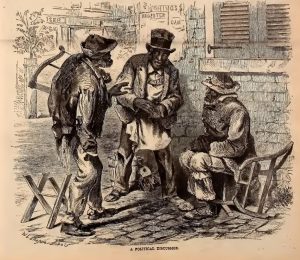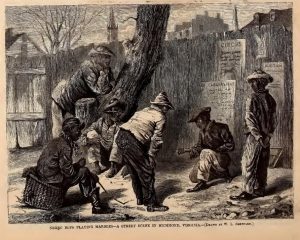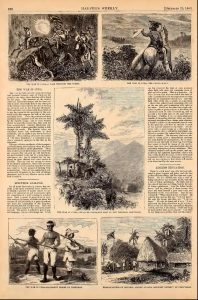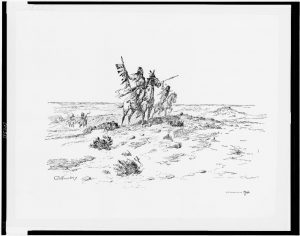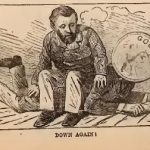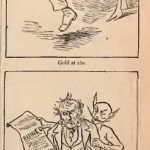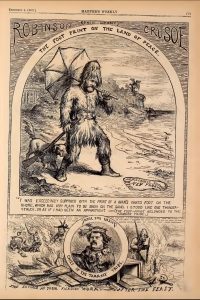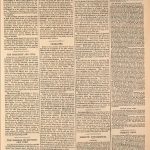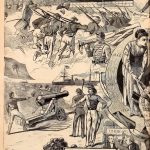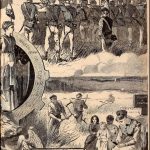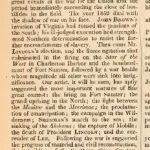According to documentation at Project Gutenberg, President Ulysses S. Grant sent his first annual message to Congress when it reconvened early in December 1869. It was a long report; overall things seemed pretty peaceable. Reconstruction in the Southern states was progressing. The president seemed to encourage a gradual return to the gold standard. The federal government ran a surplus for the fiscal year ending June 30, 1869. Congress should make sure that the office of Commissioner of Internal Revenue received the pay and prestige it deserved. The United States shouldn’t enforce its “views upon unwilling nations.” President Grant wanted to stop citizens of foreign nations becoming naturalized U.S. citizens only as a kind of backstop – these people would continue to live and work in their home country for years until “civil discord” or being drafted into military service made them escape to the United States. It seems that the president saw trade as a way to promote the nation’s self-interest. President Grant was using Quakers to run a few Indian reservations and military officers as agents to the natives not on reservations. He thought that the best policy was to eventually get all the aborigines living on reservations. The document contained over 7600 words; here are some excerpts:
FIRST ANNUAL MESSAGE.
EXECUTIVE MANSION, Washington, D.C., December 6, 1869.
To the Senate and House of Representatives:
In coming before you for the first time as Chief Magistrate of this great nation, it is with gratitude to the Giver of All Good for the many benefits we enjoy. We are blessed with peace at home, and are without entangling alliances abroad to forebode trouble; with a territory unsurpassed in fertility, of an area equal to the abundant support of 500,000,000 people, and abounding in every variety of useful mineral in quantity sufficient to supply the world for generations; with exuberant crops; with a variety of climate adapted to the production of every species of earth’s riches and suited to the habits, tastes, and requirements of every living thing; with a population of 40,000,000 free people, all speaking one language; with facilities for every mortal to acquire an education; with institutions closing to none the avenues to fame or any blessing of fortune that may be coveted; with freedom of the pulpit, the press, and the school; with a revenue flowing into the National Treasury beyond the requirements of the Government. Happily, harmony is being rapidly restored within our own borders. Manufactures hitherto unknown in our country are springing up in all sections, producing a degree of national independence unequaled by that of any other power.
These blessings and countless others are intrusted to your care and mine for safe-keeping for the brief period of our tenure of office. In a short time we must, each of us, return to the ranks of the people, who have conferred upon us our honors, and account to them for our stewardship. I earnestly desire that neither you nor I may be condemned by a free and enlightened constituency nor by our own consciences.
Emerging from a rebellion of gigantic magnitude, aided, as it was, by the sympathies and assistance of nations with which we were at peace, eleven States of the Union were, four years ago, left without legal State governments. A national debt had been contracted; American commerce was almost driven from the seas; the industry of one-half of the country had been taken from the control of the capitalist and placed where all labor rightfully belongs—in the keeping of the laborer. The work of restoring State governments loyal to the Union, of protecting and fostering free labor, and providing means for paying the interest on the public debt has received ample attention from Congress. Although your efforts have not met with the success in all particulars that might have been desired, yet on the whole they have been more successful than could have been reasonably anticipated.
Seven States which passed ordinances of secession have been fully restored to their places in the Union. The eighth (Georgia) held an election at which she ratified her constitution, republican in form, elected a governor, Members of Congress, a State legislature, and all other officers required. The governor was duly installed, and the legislature met and performed all the acts then required of them by the reconstruction acts of Congress. Subsequently, however, in violation of the constitution which they had just ratified (as since decided by the supreme court of the State), they unseated the colored members of the legislature and admitted to seats some members who are disqualified by the third clause of the fourteenth amendment to the Constitution—an article which they themselves had contributed to ratify. Under these circumstances I would submit to you whether it would not be wise, without delay, to enact a law authorizing the governor of Georgia to convene the members originally elected to the legislature, requiring each member to take the oath prescribed by the reconstruction acts, and none to be admitted who are ineligible under the third clause of the fourteenth amendment.
The freedmen, under the protection which they have received, are making rapid progress in learning, and no complaints are heard of lack of industry on their part where they receive fair remuneration for their labor. The means provided for paying the interest on the public debt, with all other expenses of Government, are more than ample. The loss of our commerce is the only result of the late rebellion which has not received sufficient attention from you. To this subject I call your earnest attention. I will not now suggest plans by which this object may be effected, but will, if necessary, make it the subject of a special message during the session of Congress.
At the March term Congress by joint resolution authorized the Executive to order elections in the States of Virginia, Mississippi, and Texas, to submit to them the constitutions which each had previously, in convention, framed, and submit the constitutions, either entire or in separate parts, to be voted upon, at the discretion of the Executive. Under this authority elections were called. In Virginia the election took place on the 6th of July, 1869. The governor and lieutenant-governor elected have been installed. The legislature met and did all required by this resolution and by all the reconstruction acts of Congress, and abstained from all doubtful authority. I recommend that her Senators and Representatives be promptly admitted to their seats, and that the State be fully restored to its place in the family of States. Elections were called in Mississippi and Texas, to commence on the 30th of November, 1869, and to last two days in Mississippi and four days in Texas. The elections have taken place, but the result is not known. It is to be hoped that the acts of the legislatures of these States, when they meet, will be such as to receive your approval, and thus close the work of reconstruction.
Among the evils growing out of the rebellion, and not yet referred to, is that of an irredeemable currency. It is an evil which I hope will receive your most earnest attention. It is a duty, and one of the highest duties, of Government to secure to the citizen a medium of exchange of fixed, unvarying value. This implies a return to a specie basis, and no substitute for it can be devised. It should be commenced now and reached at the earliest practicable moment consistent with a fair regard to the interests of the debtor class. Immediate resumption, if practicable, would not be desirable. It would compel the debtor class to pay, beyond their contracts, the premium on gold at the date of their purchase, and would bring bankruptcy and ruin to thousands. Fluctuation, however, in the paper value of the measure of all values (gold) is detrimental to the interests of trade. It makes the man of business an involuntary gambler, for in all sales where future payment is to be made both parties speculate as to what will be the value of the currency to be paid and received. I earnestly recommend to you, then, such legislation as will insure a gradual return to specie payments and put an immediate stop to fluctuations in the value of currency.
The methods to secure the former of these results are as numerous as are the speculators on political economy. To secure the latter I see but one way, and that is to authorize the Treasury to redeem its own paper, at a fixed price, whenever presented, and to withhold from circulation all currency so redeemed until sold again for gold.
The vast resources of the nation, both developed and undeveloped, ought to make our credit the best on earth. With a less burden of taxation than the citizen has endured for six years past, the entire public debt could be paid in ten years. But it is not desirable that the people should be taxed to pay it in that time. Year by year the ability to pay increases in a rapid ratio. But the burden of interest ought to be reduced as rapidly as can be done without the violation of contract. The public debt is represented in great part by bonds having from five to twenty and from ten to forty years to run, bearing interest at the rate of 6 per cent and 5 per cent, respectively. It is optional with the Government to pay these bonds at any period after the expiration of the least time mentioned upon their face. The time has already expired when a great part of them may be taken up, and is rapidly approaching when all may be. It is believed that all which are now due may be replaced by bonds bearing a rate of interest not exceeding 4-1/2 per cent, and as rapidly as the remainder become due that they may be replaced in the same way. To accomplish this it may be necessary to authorize the interest to be paid at either of three or four of the money centers of Europe, or by any assistant treasurer of the United States, at the option of the holder of the bond. I suggest this subject for the consideration of Congress, and also, simultaneously with this, the propriety of redeeming our currency, as before suggested, at its market value at the time the law goes into effect, increasing the rate at which currency shall be bought and sold from day to day or week to week, at the same rate of interest as Government pays upon its bonds.
The subjects of tariff and internal taxation will necessarily receive your attention. The revenues of the country are greater than the requirements, and may with safety be reduced. But as the funding of the debt in a 4 or a 4-1/2 per cent loan would reduce annual current expenses largely, thus, after funding, justifying a greater reduction of taxation than would be now expedient, I suggest postponement of this question until the next meeting of Congress.
It may be advisable to modify taxation and tariff in instances where unjust or burdensome discriminations are made by the present laws, but a general revision of the laws regulating this subject I recommend the postponement of for the present. I also suggest the renewal of the tax on incomes, but at a reduced rate, say of 3 per cent, and this tax to expire in three years.
With the funding of the national debt, as here suggested, I feel safe in saying that taxes and the revenue from imports may be reduced safely from sixty to eighty millions per annum at once, and may be still further reduced from year to year, as the resources of the country are developed.
The report of the Secretary of the Treasury shows the receipts of the Government for the fiscal year ending June 30, 1869, to be $370,943,747, and the expenditures, including interest, bounties, etc., to be $321,490,597. The estimates for the ensuing year are more favorable to the Government, and will no doubt show a much larger decrease of the public debt.
The receipts in the Treasury beyond expenditures have exceeded the amount necessary to place to the credit of the sinking fund, as provided by law. To lock up the surplus in the Treasury and withhold it from circulation would lead to such a contraction of the currency as to cripple trade and seriously affect the prosperity of the country. Under these circumstances the Secretary of the Treasury and myself heartily concurred in the propriety of using all the surplus currency in the Treasury in the purchase of Government bonds, thus reducing the interest-bearing indebtedness of the country, and of submitting to Congress the question of the disposition to be made of the bonds so purchased. The bonds now held by the Treasury amount to about seventy-five millions, including those belonging to the sinking fund. I recommend that the whole be placed to the credit of the sinking fund.
Your attention is respectfully invited to the recommendations of the Secretary of the Treasury for the creation of the office of commissioner of customs revenue; for the increase of salaries to certain classes of officials; the substitution of increased national-bank circulation to replace the outstanding 3 per cent certificates; and most especially to his recommendation for the repeal of laws allowing shares of fines, penalties, forfeitures, etc., to officers of the Government or to informers.
The office of Commissioner of Internal Revenue is one of the most arduous and responsible under the Government. It falls but little, if any, short of a Cabinet position in its importance and responsibilities. I would ask for it, therefore, such legislation as in your judgment will place the office upon a footing of dignity commensurate with its importance and with the character and qualifications of the class of men required to fill it properly.
As the United States is the freest of all nations, so, too, its people sympathize with all people struggling for liberty and self-government; but while so sympathizing it is due to our honor that we should abstain from enforcing our views upon unwilling nations and from taking an interested part, without invitation, in the quarrels between different nations or between governments and their subjects. Our course should always be in conformity with strict justice and law, international and local. Such has been the policy of the Administration in dealing with these questions. For more than a year a valuable province of Spain, and a near neighbor of ours, in whom all our people can not but feel a deep interest, has been struggling for independence and freedom. The people and Government of the United States entertain the same warm feelings and sympathies for the people of Cuba in their pending struggle that they manifested throughout the previous struggles between Spain and her former colonies in behalf of the latter. But the contest has at no time assumed the conditions which amount to a war in the sense of international law, or which would show the existence of a de facto political organization of the insurgents sufficient to justify a recognition of belligerency. …
[In addition to the rebellion in Cuba, President Grant reviewed the foreign relations of the United States, including the Spanish seizure of a couple U.S. ships, “the subject of an interoceanic canal to connect the Atlantic and Pacific oceans through the Isthmus of Darien,” the settlement of all claims between Great Britain and the United States (probably including the CSS Alabama), and more.
… The unsettled political condition of other countries, less fortunate than our own, sometimes induces their citizens to come to the United States for the sole purpose of becoming naturalized. Having secured this, they return to their native country and reside there, without disclosing their change of allegiance. They accept official positions of trust or honor, which can only be held by citizens of their native land; they journey under passports describing them as such citizens; and it is only when civil discord, after perhaps years of quiet, threatens their persons or their property, or when their native state drafts them into its military service, that the fact of their change of allegiance is made known. They reside permanently away from the United States, they contribute nothing to its revenues, they avoid the duties of its citizenship, and they only make themselves known by a claim of protection. I have directed the diplomatic and consular officers of the United States to scrutinize carefully all such claims for protection. The citizen of the United States, whether native or adopted, who discharges his duty to his country, is entitled to its complete protection. While I have a voice in the direction of affairs I shall not consent to imperil this sacred right by conferring it upon fictitious or fraudulent claimants. …
Our manufactures are increasing with wonderful rapidity under the encouragement which they now receive. With the improvements in machinery already effected, and still increasing, causing machinery to take the place of skilled labor to a large extent, our imports of many articles must fall off largely within a very few years. Fortunately, too, manufactures are not confined to a few localities, as formerly, and it is to be hoped will become more and more diffused, making the interest in them equal in all sections. They give employment and support to hundreds of thousands of people at home, and retain with us the means which otherwise would be shipped abroad. The extension of railroads in Europe and the East is bringing into competition with our agricultural products like products of other countries. Self-interest, if not self-preservation, therefore dictates caution against disturbing any industrial interest of the country. It teaches us also the necessity of looking to other markets for the sale of our surplus. Our neighbors south of us, and China and Japan, should receive our special attention. It will be the endeavor of the Administration to cultivate such relations with all these nations as to entitle us to their confidence and make it their interest, as well as ours, to establish better commercial relations. …
On my assuming the responsible duties of Chief Magistrate of the United States it was with the conviction that three things were essential to its peace, prosperity, and fullest development. First among these is strict integrity in fulfilling all our obligations; second, to secure protection to the person and property of the citizen of the United States in each and every portion of our common country, wherever he may choose to move, without reference to original nationality, religion, color, or politics, demanding of him only obedience to the laws and proper respect for the rights of others; third, union of all the States, with equal rights, indestructible by any constitutional means.
To secure the first of these, Congress has taken two essential steps: First, in declaring by joint resolution that the public debt shall be paid, principal and interest, in coin; and, second, by providing the means for paying. Providing the means, however, could not secure the object desired without a proper administration of the laws for the collection of the revenues and an economical disbursement of them. To this subject the Administration has most earnestly addressed itself, with results, I hope, satisfactory to the country. There has been no hesitation in changing officials in order to secure an efficient execution of the laws, sometimes, too, when, in a mere party view, undesirable political results were likely to follow; nor any hesitation in sustaining efficient officials against remonstrances wholly political.
It may be well to mention here the embarrassment possible to arise from leaving on the statute books the so-called “tenure-of-office acts,” and to earnestly recommend their total repeal. It could not have been the intention of the framers of the Constitution, when providing that appointments made by the President should receive the consent of the Senate, that the latter should have the power to retain in office persons placed there by Federal appointment against the will of the President. The law is inconsistent with a faithful and efficient administration of the Government. What faith can an Executive put in officials forced upon him, and those, too, whom he has suspended for reason? How will such officials be likely to serve an Administration which they know does not trust them?
For the second requisite to our growth and prosperity time and a firm but humane administration of existing laws (amended from time to time as they may prove ineffective or prove harsh and unnecessary) are probably all that are required.
The third can not be attained by special legislation, but must be regarded as fixed by the Constitution itself and gradually acquiesced in by force of public opinion.
From the foundation of the Government to the present the management of the original inhabitants of this continent—the Indians—has been a subject of embarrassment and expense, and has been attended with continuous robberies, murders, and wars. From my own experience upon the frontiers and in Indian countries, I do not hold either legislation or the conduct of the whites who come most in contact with the Indian blameless for these hostilities. The past, however, can not be undone, and the question must be met as we now find it. I have attempted a new policy toward these wards of the nation (they can not be regarded in any other light than as wards), with fair results so far as tried, and which I hope will be attended ultimately with great success. The Society of Friends is well known as having succeeded in living in peace with the Indians in the early settlement of Pennsylvania, while their white neighbors of other sects in other sections were constantly embroiled. They are also known for their opposition to all strife, violence, and war, and are generally noted for their strict integrity and fair dealings. These considerations induced me to give the management of a few reservations of Indians to them and to throw the burden of the selection of agents upon the society itself. The result has proven most satisfactory. It will De [be] found more fully set forth in the report of the Commissioner of Indian Affairs. For superintendents and Indian agents not on the reservations, officers of the Army were selected. The reasons for this are numerous. Where Indian agents are sent, there, or near there, troops must be sent also. The agent and the commander of troops are independent of each other, and are subject to orders from different Departments of the Government. The army officer holds a position for life; the agent, one at the will of the President. The former is personally interested in living in harmony with the Indian and in establishing a permanent peace, to the end that some portion of his life may be spent within the limits of civilized society; the latter has no such personal interest. Another reason is an economic one; and still another, the hold which the Government has upon a life officer to secure a faithful discharge of duties in carrying out a given policy.
The building of railroads, and the access thereby given to all the agricultural and mineral regions of the country, is rapidly bringing civilized settlements into contact with all the tribes of Indians. No matter what ought to be the relations between such settlements and the aborigines, the fact is they do not harmonize well, and one or the other has to give way in the end. A system which looks to the extinction of a race is too horrible for a nation to adopt without entailing upon itself the wrath of all Christendom and engendering in the citizen a disregard for human life and the rights of others, dangerous to society. I see no substitute for such a system, except in placing all the Indians on large reservations, as rapidly as it can be done, and giving them absolute protection there. As soon as they are fitted for it they should be induced to take their lands in severalty and to set up Territorial governments for their own protection. For full details on this subject I call your special attention to the reports of the Secretary of the Interior and the Commissioner of Indian Affairs. …
[Next is a summary of Cabinet Department reports]
… There are many subjects not alluded to in this message which might with propriety be introduced, but I abstain, believing that your patriotism and statesmanship will suggest the topics and the legislation most conducive to the interests of the whole people. On my part I promise a rigid adherence to the laws and their strict enforcement.
U.S. GRANT.
I don’t know much about the Grant Administration except that it was supposed to scandal-plagued. According to Wikipedia the first Grant Administration scandal was the Black Friday Gold Panic 1869. Jay Gould and James Fisk led a plan to manipulate the price of gold by ensuring that the federal government stopped using federally-owned gold to buy back bonds and reduce the government debt. At first, President Grant naively went along. When he realized what was going on, he and Secretary of the Treasury George Boutwell agreed to begin buying bonds again with government-owned gold. On September 24, 1869 Secretary Boutwell used $4,000,000 worth of gold to buy bonds. The artificially high price of gold collapsed and many investors were ruined:
“The gold panic devastated the United States economy for months. Stock prices plunged and the price of food crops such as wheat and corn dropped severely, devastating farmers who did not recover for years afterward. Gould had earlier claimed to Grant that raising the price of gold would actually help farmers. Also Fisk refused to pay off many of his investors who had bought gold on paper. The volume of stocks being sold on Wall Street decreased by 20%. Fisk and Gould, who could afford to hire the best lawyers, were never held accountable for their profiteering, as favorable judges declined to prosecute.”
______________________________________
Harper’s Weekly began 1869 with sky-high expectations for the new year in general and the incipient Grant Administration in particular. The newspaper seemed quite a bit more muted as 1870 rolled around, but it still had a great deal of faith President Grant’s character. From the January 8, 1870 issue of Harper’s Weekly:
THE NEW YEAR.
The new year opens with the world outwardly at peace, except in Cuba and Paraguay. At home, the administration of General GRANT, which began with such high hopes, is stronger in public confidence than ever. The eager expectations of “a splendid administration” may have been chastened; for to compose the country after a civil tempest, to encourage the return of industry to its proper channels, and to pay the debt, are not precisely a “splendid,” although the most necessary policy. Those who anticipated splendor meant probably annexation. It was their hope that Canada and the West Indies would fall under our control. That is, perhaps, still their hope. It would not be surprising if President GRANT himself should expect or wish to signalize his administration by an extension of the national domain. Perhaps it has occurred to him that in some honorable way Canada might fall to us out of the Alabama complication. Perhaps he has supposed that Spain, no longer suspicious after the release of the gun-boats, might not be unwilling to think of selling Cuba.
But whatever the President’s hopes or wishes may be, his character and his conduct equally show that the country has nothing to expect but what is most fair, most reasonable, and most patriotic. After ten months’ strictest observation of General GRANT in his great office, for which it was alleged that, however good a soldier he might be, he was certainly not fitted, his sturdy honesty, his natural rectitude of feeling, his remarkable sagacity and alert apprehension, have impressed the country with a profound conviction that the public welfare is peculiarly safe in his hands, and he is trusted as President LINCOLN was trusted, and as few other Presidents have been. His Cabinet, although not composed of party leaders, is evidently a body of wise counselors; and General GRANT would not be where he is if he were not capable of selecting sound advisors and following good counsels. Undoubtedly the general feeling is that the Administration has no other purpose than the public good, and that the character of its members is an [?] earnest of its devotion to that object.
During General GRANT’S Presidency the Union will be wholly restored, equal rights secured, the debt generally reduced, taxation diminished, and the foreign questions satisfactorily adjusted. These results are foreshadowed by the experience of this year, and without territorial extension these certainly supply real “splendor” enough to any Administration. Yet to increase the national territory is always a popular policy. Unquestionably Mr. SEWARD believes that he will be as gratefully remembered for acquiring Alaska as for defending freedom in California and Kansas. But, however inevitable the extension of our limits may be, the addition of a population foreign in race, language, and traditions of every kind is not an unmixed blessing. The consciousness of this fact evidently subdues the popular impulse that demands annexation. Formerly the impulse seemed more positive, for annexation was the political policy of a faction to strengthen slavery. Now, fortunately, it has only its normal play. And, we repeat, if increase of territory is to be added to the trophies of the GRANT Administration, it will be in the most honorable and satisfactory manner.
Abroad, there is not only peace between the great states, but there is an especial friendliness towards us. If it is to be explained by the proved power of this country and certain accusing reminiscences elsewhere, let us now at least remember that as a slaveholding republic we did not conciliate other nations, and that we have as carefully avoided sentimentality in international relations as any foreign government. The Christmas sun shines upon the English war steamer bringing respectfully to America the body of a noted American who had made both countries his home; while the best known and most beloved of all our English friends during our struggle is a conspicuous member of the British government, which modifies at our wish its old doctrine of allegiance. In France LOUIS NAPOLEON speaks us fair. Spain sees that we are friendly. Germany also allows expatriation at our request. Austria gives her hand to us in freeing her schools from ecclesiastical control. Russia is our ally, and little Denmark, unwilling to be deceived, waits to see that our plighted faith be fulfilled.
So friendly and full of promise opens the new year. But for us its chief glory is that it dawns not only on the Union fully restored, but consecrated to equal liberty and pledged to its defense. If any where in the land – in Texas, in Georgia, in Mississippi – the old tyranny asserts itself to abuse a single friendless citizen, the power of the whole is bound for his protection. Let us make that the American practice as well as the American principle. Let the cabin of the most unfortunate and forlorn of our brethren feel our protecting hand – feel that they are to have an honest chance to rise as men out of the brutishness into which we suffered them to be trampled, and they will indeed feel that the light of a new year shines upon their long night, and that they hear, as the Syrian shepherds heard, the divine gospel: “Peace on Earth: Good-will to men.”
In the same issue Harper’s Weekly pictorially reviewed the decade that had just ended:


